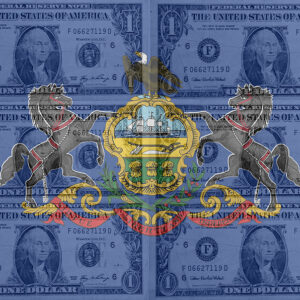Pennsylvania state government spending ballooned 33 percent between fiscal years 2018 and 2023, far faster than the rate of inflation, according to the Pennsylvania Independent Fiscal Office (IFO). And under the leadership of Gov. Josh Shapiro and a Democratic majority in the House of Representatives, spending jumped another $4.46 billion in just two years.
Now Republicans in Harrisburg are warning the state budget is at risk of a “dismal collapse” according to the Pennsylvania House GOP top budget analyst.
“People thought the Rendell administration was spending like drunken sailors, but when Wolf took over and then COVID happened, spending just skyrocketed,” observed Rep. Seth Grove (R-Dover Township).
In 2018, the legislature approved a budget of $33.4 billion. Last month, Shapiro signed a $47.6 billion budget.
While a significant part of the spending surge was due to COVID, much of it funded by federal dollars, that money is running out. That means the government will rely on state tax revenue to fund operations.
Those revenues remain flat. Pennsylvania brought in $45.47 billion in taxes for Fiscal Year 2023. It was $44.92 billion in FY 2022.
“No one wants to talk about how we’re going to continue to fund that level of spending over the next few years,” said Grove.
Pennsylvania can’t rely on its $6.6 billion budget surplus forever. The IFO says more than $3.3 billion of the surplus would be wiped out in this fiscal year. The rest of the $2.9 billion surplus would be spent in FY 2025.
Democrat legislative leaders have ruled out tax hikes or tapping the almost $7 billion Rainy Day Fund.
How does Pennsylvania fix its budget deficit?
Grove endorsed spending cuts and pointed towards human services, pre K-12 education, and corrections – the top three budget items. Human services accounted for about 40 percent of the state budget, while lower education made up more than 36 percent. Corrections was about 6.7 percent.
Grove said the state pays too much for all three.
Since 2010, the state’s prison population has plunged by about 30 percent, from 51,312 to 36,000 last year. Over that same period, taxpayer spending on the Department of Corrections budget nearly doubled — from $1.9 billion in 2010 to $3.15 billion today.
There is a similar trend with state employee spending. In 2010, the state employed more than 83,000 workers at a cost of $3.9 billion. Today the number of workers has fallen to 77,000 — a decline of 7 percent — while spending shot up to $18.96 billion.
And while it’s common for candidates on the political left to complain that Pennsylvania doesn’t spend enough on education, the budget numbers tell a different story. State education spending jumped from $9.3 billion in 2011 to $17.3 billion in 2024, even as school enrollment declined. There were close to 1.8 million students enrolled in Keystone State public schools in 2011. Today that number is around 1.5 million.
Grove argued it was time for legislators to look at which state programs work and which ones don’t. He said Shapiro and his budget department should focus on “zero-based budgeting” to make sure money is spent wisely. It’s a concept the governor is familiar with. Shapiro used “zero-based budgeting” while Montgomery County Commission chair, Grove noted.
“That’s the path forward. Yes, it takes more work and it’s not easy. But you’re going to get better results,” Grove said.
That may not happen. Grove said there’s no appetite in Harrisburg for spending cuts. But he doesn’t think the government can keep throwing money at problems and hope everything worked out. “At some point we’ll have to look at programs,” he said.
He predicted the Shapiro administration and his allies in the House will use budget gimmicks to fill the deficit. These include delaying payments, taking out bond money for operational costs, and getting businesses to pay taxes sooner.
The risk there is that these moves could hurt Pennsylvania’s credit rating. Despite praising the commonwealth’s fiscal outlook, all three major credit rating bureaus urged Pennsylvania to keep “substantial reserves” on hand to avoid any sort of rating drop. The state was also told to balance its budget.
Grove is pessimistic about Pennsylvania’s budget future.
“Hopefully we’ll improve. It doesn’t look that way, but we can all pray.”
Please follow DVJournal on social media: X@DVJournal or Facebook.com/DelawareValleyJournal

